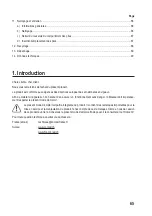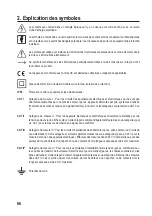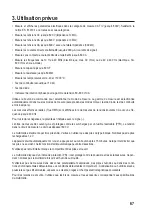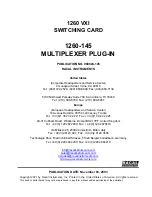
57
Never use the multimeter when the battery compartment is open, as this may cause a fatal electric
shock.
Do not leave empty batteries in the device. Even batteries protected against leaking may corrode
and destroy the device or release chemicals that are detrimental to your health.
Do not leave batteries unattended, as there is a risk that they may be swallowed by children or pets.
If a battery is swallowed, seek immediate medical advice.
To prevent the batteries from leaking, remove them from the multimeter if you are not going to use
the device for an extended period of time.
Leaking or damaged batteries may cause acid burns if they come into contact with your skin.
Always use protective gloves when handling leaking or damaged batteries.
Do not short-circuit batteries or throw them into open flames.
Do not attempt to recharge or dismantle disposable batteries, as this may cause an explosion.
The following battery is suitable for use in the multimeter:
Order no. 652278 (3 batteries are required).
Only use alkaline batteries – alkaline batteries are more powerful and have a longer lifespan.
12. Disposal
Electronic devices are recyclable waste materials and must not be disposed of in household waste.
Always dispose of the product according to the relevant statutory regulations.
Batteries should be disposed of separately from the product.
Battery disposal
As the end user, you are required by law to return all used batteries. They must not be placed in household
waste.
Batteries that contain harmful substances are labelled with this symbol to indicate that they must not be
placed in household waste. The abbreviations for heavy metals in batteries are: Cd = Cadmium, Hg =
Mercury, Pb = Lead. You can return used batteries to a local recycling point or battery retailer.
You thus fulfil your statutory obligations and contribute to the protection of the environment.
Summary of Contents for VC-740E
Page 126: ...126 ...
Page 127: ...127 ...
















































